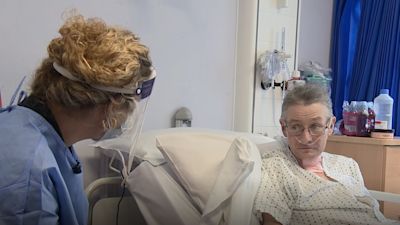'I'm lucky that I'm alive': Covid-19 patient learning how to walk and talk again after six months in hospital

ITV News Health Editor Emily Morgan reports on the serious complications and symptoms that can arise after contracting Covid-19
A 48-year-old man who became so ill with Covid-19 he is having to learn how to walk and talk again after spending more than half a year in hospital.
Rob Orton was hospitalised with coronavirus in November and put on a ventilator.
Six months later and he is suffering from Long Covid.
The father-of-two now has damaged lungs, has had numerous infections and cannot eat solid foods after having a tracheostomy.
ITV News met Mr Orton in January, when he was unable to speak and communicated with our Health Editor Emily Morgan with a whiteboard.
He now fears his life will never go back to "normal".
He told ITV News: "The doctors were saying you'll be on the ventilator for three days, you'll be home in a week's time."
"Six months down the trot, I'm still here."
'It could've gone on 10 days and I'd be getting on with my life now, but it didn't - it went the other way': Covid patient Rob Orton says he is 'lucky to be alive' after being on a ventilator five months ago
However, he believes he is "lucky to be alive".
"Nobody, even the doctors, the professionals, nobody knows where this disease could lead.
"It could've gone on 10 days, I'd be out of here, I'd be getting on with my life now - but it didn't, it went the other way."
'I cried when I could finally take a short walk': Living with Long Covid
How Long Covid sufferers are learning breathing techniques used by opera singers to recover
He added: "I'm lucky that I'm still here, I'm lucky that I'm alive. I can say that because a couple of people said I shouldn't be."
His wife Coleen Orton has told ITV News of the lasting effects her husband's Covid infection will likely have on their lives.
'It's changed our whole future': Rob Orton's wife Coleen describes what it was like to tell her children their dad might die
When asked by Emily Morgan whether there were moments where she thought it would be the end, Mrs Orton said: "There was several moments along the way.
"A lot of moments where they would phone in the middle of the night. So when they first put him on the ventilator, they phoned us, it was really late at night.
"It was about half past 10, 11, and then the dark on your own. It's terrifying, absolutely terrifying."
Mrs Orton added: "And then the following morning, I had to wake up and tell the children. And how would you tell them that Dad might not come home?
"Because I did have to have that conversation with them, they're of an age that they understand that.
"So when you're laying in the middle of the night and the phone's ringing, that's terrifying - and it was on more than one occasion.
"There have been quite a lot of times along the way that he could have gone the other way, so he's very lucky to be alive and we're very lucky to have him still," she added.
Listen to the latest episode of our Coronavirus podcast, including a special on long Covid and what's being done to help sufferers...
Referring to her fears for her husband's mental and physical well-being, Mrs Orton said: "It's a life changing illness. It's changed our whole future, really.
"We had plans to travel abroad now the children are older. We were going to go maybe to Australia, those kinds of things probably aren't going to happen now."
Her comments come as scientists have found the road to recovery for Covid patients is complicated.
The Office for National Statistics (ONS) found that 29% of patients who are hospitalised due to Covid-19 are readmitted within six months, and more than 12% die within the same period.
Dr Razak Kehinde, Mr Orton's consultant at Watford General Hospital, told ITV News there will likely be a surge in patients as they are seeing more "longstanding complications" from Covid-19.
"There is no doubt that we will get to see more patients come back with longstanding complications which could vary from very little to very severe," Mr Kehinde said.
He added: "And we're only just beginning to understand it. It's certainly not something that we're taught about in medical school or have had lots of experience in and we're already starting to see these effects.
"We hear of the Long Covid, and that, again, when you look at the symptoms, the myriad of symptoms that people present with, it can be quite varied, from very, very minor things to, to being significantly disabled.
"And obviously these patients will come back and need more help from the NHS," he added.